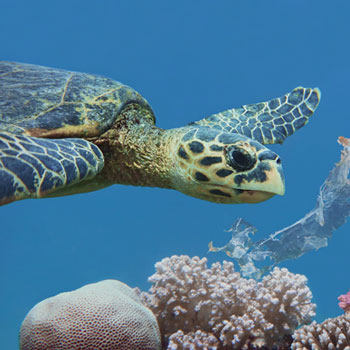Marine Litter
Marine litter is a global problem that affects our oceans. It is an environmental, human health and socio-economic problem that is symptomatic of a throw-away society. With worldwide growth in the amount of solid litter disposed of and slow rates of degradation, the amount of litter present in the marine environment is increasing exponentially. This MOOC is part of the Clean Seas Campaign and contributes to the mission of the Global Partnership on Marine Litter (GPML), which seeks to protect the global marine environment, human well-being and animal welfare by addressing the challenges of marine litter.
Massive Open Online Course (MOOC)
Since it began, more than 22 thousand people have signed onto the course to learn more about marine litter and microplastics prevention. The MOOC seeks to inspire people of all ages to take action and leadership, and to provide examples and case studies that will inspire evidence-based, targeted actions and increase awareness of and stimulate creative solutions to this pressing global issue. Moreover, this course will benefit policymakers, practitioners, and managers who wish to connect with other professionals in order to enhance their knowledge of marine litter issues. The study material consists of a series of lectures, case studies and videos.
Register now
The MOOC is a free course that will start on October 26, 2020. Registration is open until November 20, and available in the following languages: the Expert Track is offered in English, Spanish and Russian; the Leadership Track is available in Chinese, Arabic, French, Portuguese, Indonesian, Vietnamese and Thai. After completing one or both tracks you will receive a certificate of participation and free access to all course materials on the 24-hour online Trifork platform.
Cooperation with UNEP
The Open Universiteit and UN Environment Program have created this MOOC in order to address a worldwide interest in capacity building and actionable learning on marine litter, as well as to create opportunities for a wider audience. Over the next five years, the aim is to empower stakeholders and bring many more people around the world together, to try and find solutions to this complex challenge, regardless of their academic and professional background or location. Dr. Ansje Löhr leads the project.

